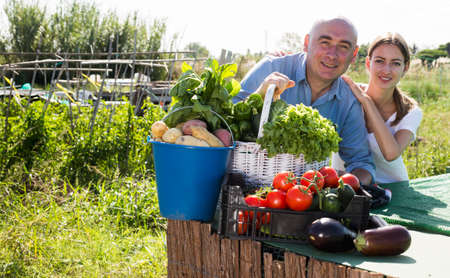Introduction to Composting in UK Allotments
Composting has long been an integral practice for allotment gardeners across the United Kingdom, offering a sustainable and efficient method of managing organic waste while enhancing soil fertility. As urban and suburban spaces become increasingly focused on self-sufficiency and environmentally responsible gardening, composting stands out as both a practical and ecological solution. For UK allotment holders, understanding composting is not merely about reducing household or garden waste; it is about transforming that waste into a valuable resource that nurtures crops year after year.
The relevance of composting to UK allotment holders is underscored by the nations rich tradition of community gardening and its commitment to environmental stewardship. With many local councils encouraging green initiatives, allotmenteers are uniquely positioned to contribute positively to their communities by adopting effective composting practices. Moreover, well-maintained compost heaps can significantly reduce the reliance on commercial fertilisers, lowering costs and minimising chemical input into the environment.
From an environmental perspective, composting helps divert significant amounts of biodegradable material from landfill sites, thereby reducing methane emissions—a key contributor to climate change. Practically speaking, compost enriches the soil structure, improves moisture retention, and promotes robust plant growth, all of which are essential for productive UK allotments. By embracing the science of composting, allotment gardeners can achieve healthier harvests while supporting broader ecological goals.
2. Understanding the Composting Process
For allotment gardeners across the UK, gaining a solid grasp of the composting process is essential for transforming garden waste into nutrient-rich compost. At its core, composting is a natural process driven by biological and chemical mechanisms that break down organic matter into humus—a stable and valuable soil amendment. The effectiveness of composting hinges on the interplay between decomposition processes and the key agents involved.
Biological Mechanisms: The Role of Microorganisms
The science of composting begins with a diverse community of microorganisms—primarily bacteria, fungi, and actinomycetes. These microscopic agents are responsible for the initial breakdown of organic material such as vegetable peelings, grass clippings, and woody stems commonly found in UK allotments. As these organisms feed on organic waste, they generate heat, which accelerates decomposition and helps kill off weed seeds and pathogens.
Key Decomposers in the Compost Heap
| Agent | Role in Composting | Optimal Conditions |
|---|---|---|
| Bacteria (mesophilic & thermophilic) | Initiate rapid breakdown of simple compounds; generate heat during active composting stages | Moisture: 40-60% Temperature: 20-70°C Oxygen: Aerobic conditions |
| Fungi | Decompose tough plant materials like lignin and cellulose (e.g., woody stems) | Moist but not saturated environments; slightly lower temperatures than bacteria |
| Actinomycetes | Break down complex organics; impart earthy smell to mature compost | Aerobic conditions; moderate moisture; neutral pH preferred |
| Invertebrates (worms, beetles, mites) | Physically fragment materials, increasing surface area for microbes to work on | Damp and well-aerated heaps; avoid extreme temperatures |
Chemical Processes: Decomposition Dynamics
The chemical transformation during composting centres around the conversion of carbon-rich (browns) and nitrogen-rich (greens) materials. Bacteria use nitrogen to build proteins and carbon as an energy source. The ideal carbon-to-nitrogen ratio (C:N) for effective composting is roughly 30:1. This balance ensures active microbial growth without unpleasant odours or slow breakdown.
Chemical Changes During Composting
- Mineralisation: Organic nitrogen is converted into ammonium and then nitrate, making it available for plants.
- Humification: Simple compounds are transformed into complex humic substances, improving soil structure and fertility.
- pH Fluctuations: The heap initially becomes more acidic, but as compost matures, it stabilises to near-neutral levels suitable for most UK crops.
Summary Table: Key Factors in Composting Science
| Factor | Effect on Process | UK Allotment Tips |
|---|---|---|
| C:N Ratio | Affects speed and efficiency of decomposition; imbalance leads to odour or inactivity | Add shredded newspaper or dry leaves to balance grass clippings/kitchen waste; mix regularly |
| Aeration (Oxygen) | Supports aerobic microbes; prevents anaerobic smells and slow decay | Turn heap every few weeks using a garden fork or aerator tool common in UK sheds |
| Moisture Content | Too dry slows microbes; too wet can turn heap anaerobic and smelly | Aim for damp sponge feel; cover with old carpet or tarpaulin in rainy British weather to regulate moisture |
| Particle Size | Smaller pieces decompose faster due to increased surface area for microbial activity | Chop woody stems before adding; use a spade or secateurs for easy management on plot paths |
This scientific understanding empowers UK allotment gardeners to manage their compost heaps effectively, ensuring a steady supply of rich compost to enhance soil health and productivity year after year.

3. Essential Ingredients for Successful Composting
The Role of Green and Brown Materials
Successful composting hinges on achieving the right balance between two key components: green and brown materials. For UK allotment gardeners, understanding the distinction between these types and how they interact is fundamental to producing nutrient-rich compost.
Green Materials: Nitrogen-Rich Inputs
Green materials provide nitrogen, a vital element that fuels the growth and reproduction of the microbes responsible for decomposition. Common green materials found in UK households and gardens include:
- Vegetable peelings (potato, carrot, onion skins)
- Fruit scraps (apple cores, banana skins)
- Fresh grass clippings
- Coffee grounds and used tea bags (preferably without plastic content)
- Annual weeds (before they go to seed)
These ingredients should be added in moderation; too much nitrogen can create unpleasant odours and slow down the composting process.
Brown Materials: Carbon-Rich Inputs
Brown materials contribute carbon, which provides energy for decomposing organisms and helps maintain structure within the compost heap, preventing it from becoming overly wet or compacted. Typical brown materials available to UK gardeners include:
- Fallen leaves (especially in autumn)
- Straw and hay
- Cardboard (egg boxes, toilet roll tubes – torn up)
- Paper (uncoated newspaper sheets, shredded)
- Woody prunings (chopped small)
Browns are especially important in wetter climates like the UK, where excess moisture can quickly lead to soggy heaps if not properly balanced.
Finding the Right Balance
An effective compost heap typically requires a mix that is roughly equal parts by volume of greens and browns, although some gardeners prefer a slightly higher proportion of browns—especially in damp weather conditions typical to British allotments. Layering or mixing these materials as you add them helps ensure even decomposition. If your compost is too wet or emits a strong smell, add more browns; if it appears dry and inactive, incorporate more greens.
Local Tip for Allotment Gardeners
Make use of seasonal surpluses—such as autumn leaves or summer grass clippings—by storing excess browns in sacks beside your heap for mixing throughout the year. This simple practice ensures a steady supply of carbon-rich material when needed.
By thoughtfully balancing green and brown inputs from your household and garden waste, UK allotment gardeners can foster an efficient composting system that supports healthy soil and productive plots year-round.
4. Managing Your Allotment Compost Heap
Effective management of your compost heap is crucial for success, particularly in the often unpredictable and damp climate of the UK. Below, we outline best practices tailored specifically to British allotment gardeners, addressing construction, ongoing care, and common troubleshooting strategies.
Building a Compost Heap: Key Steps
Begin by selecting a suitable location—ideally a well-drained, semi-shaded spot away from prevailing winds. Use reclaimed wooden pallets or wire mesh to construct a bin that allows air circulation while containing materials. Layering is essential; alternate “greens” (nitrogen-rich materials) with “browns” (carbon-rich materials) to foster a balanced decomposition process.
| Material Type | Examples | Role in Compost |
|---|---|---|
| Greens | Grass clippings, vegetable peelings, coffee grounds | Adds nitrogen; accelerates microbial activity |
| Browns | Dried leaves, cardboard, straw | Adds carbon; improves structure and airflow |
| Bulking Agents | Twiggy prunings, shredded newspaper | Prevents compaction; promotes aeration |
Maintaining the Heap: Regular Practices for UK Conditions
The moist British weather can lead to soggy heaps, so regular turning is vital to maintain aeration and avoid anaerobic conditions. If your compost is too wet (a common issue during extended rainy periods), add extra browns such as shredded cardboard or straw. Conversely, if it becomes dry during summer droughts, sprinkle with collected rainwater rather than tap water where possible.
Monitoring Progress and Troubleshooting Issues
- Temperature: A healthy heap should feel warm inside; if not, consider adding more greens and turning the pile.
- Pests: Rodents are less likely to visit if you avoid adding cooked food and regularly cover new additions with brown material.
- Odour: A foul smell usually indicates poor aeration or excess moisture—remedy this by incorporating more browns and turning the heap more frequently.
- Slow Decomposition: This may be due to cold weather or lack of nitrogen-rich material. Insulate your heap with old carpet or hessian sacks during winter and increase green input as needed.
Quick Reference: Common Problems and Solutions for UK Allotments
| Problem | Likely Cause | Solution |
|---|---|---|
| Soggy/compacted heap | Excess rain, poor drainage, too many greens | Add browns, turn frequently, improve bin drainage |
| Pile not heating up | Lack of greens or insulation in cold weather | Add more greens, insulate heap sides/top |
| Pest attraction | Cooked food waste present, exposed food scraps | Avoid cooked food waste, cover new additions with browns immediately |
| Sour smell (anaerobic) | Poor aeration or overly wet materials | Add bulking agents like twigs/cardboard, turn more often |
By following these practical guidelines suited to local UK allotment settings, you can ensure your compost heap remains productive year-round despite the ever-changing British weather. Regular attention and small adjustments will reward you with nutrient-rich compost to enhance your plot’s soil health.
5. Common Pitfalls and How to Avoid Them
Identifying Frequent Composting Issues on UK Allotments
While composting is a valuable practice for allotment gardeners across the UK, several common issues can hinder the process and reduce its effectiveness. Understanding these challenges, which are often specific to the British climate and local wildlife, is essential for maintaining a healthy and productive compost system.
Pest Problems: Rodents and Insects
Allotment compost bins can attract pests such as rats, mice, and flies. These animals are drawn by food scraps, especially cooked food or meat, which should never be added to your heap. To deter rodents, use secure, lidded bins raised off the ground where possible. Regularly turning the pile also discourages nesting. For insect infestations like fruit flies, ensure a good balance of green (nitrogen-rich) and brown (carbon-rich) materials, and cover food scraps with a layer of dry leaves or cardboard.
Unpleasant Odours
Foul smells in your compost typically indicate an imbalance or poor aeration. Excess moisture and too many green materials can create an anaerobic environment, resulting in a sour or rotten odour. To remedy this, add more brown materials such as shredded paper or straw and turn the pile more frequently to introduce oxygen. In the damp UK climate, consider covering your heap during heavy rain to prevent waterlogging.
Slow Decomposition
If your compost seems stagnant or takes too long to break down, it may be due to insufficient microbial activity or a lack of the correct material balance. Chopping up larger items helps speed decomposition. Ensure you have a roughly equal mix of greens and browns; adding garden soil or mature compost introduces beneficial microbes that accelerate breakdown. If winter slows the process—common in the UK’s cooler months—simply insulate your bin with cardboard or sacking until temperatures rise.
Summary: Proactive Compost Management
By recognising these pitfalls early and applying practical solutions tailored to UK allotment conditions, gardeners can maintain a thriving compost system. Regular monitoring, adjusting material ratios, and adapting practices for seasonal changes will ensure healthy decomposition and nutrient-rich results for your plot.
6. Benefits of Home-Made Compost in Allotment Gardening
Soil Health Enhancement
One of the primary advantages of producing home-made compost on UK allotments is its transformative effect on soil health. The crumbly, nutrient-rich matter derived from well-managed compost heaps significantly improves soil structure, aeration, and moisture retention. Traditional UK allotment soils, often challenged by compaction or nutrient depletion after years of cultivation, benefit immensely from the regular addition of organic matter. By increasing the humus content, compost helps sandy soils hold water more efficiently and allows clay soils to drain better, fostering a balanced environment for roots to thrive.
Plant Nutrition Tailored to UK Crops
Home-made compost provides a slow-release source of essential nutrients—such as nitrogen, phosphorus, and potassium—which are vital for healthy plant growth. For UK-grown staples like potatoes, broad beans, brassicas, and soft fruits, compost supports robust development and higher yields without reliance on synthetic fertilisers. Moreover, using locally sourced kitchen scraps and green waste ensures that the nutrient profile aligns closely with the needs of common British crops. This closed-loop approach mirrors traditional allotment practices where nothing goes to waste and self-sufficiency is prized.
Sustainability and Environmental Impact
The sustainability benefits of home-made compost are particularly relevant in the context of UK gardening culture. Composting diverts organic waste from landfill, reducing methane emissions while closing the resource loop within local communities. Allotmenteers who make their own compost actively participate in climate-positive action—a value increasingly reflected in UK environmental policy and grassroots gardening movements. The use of home-made compost reduces dependency on peat-based products, supporting wider conservation efforts to protect British peat bogs.
Respecting Allotment Traditions
Composting is deeply embedded in UK allotment traditions. Many plot holders pride themselves on cultivating ‘black gold’ using time-honoured methods such as turning heaps with a fork or layering green and brown materials according to the season. This practice not only fosters community knowledge-sharing but also strengthens ties between generations of gardeners who pass down tips and tricks for achieving perfect compost. In this way, home-made compost represents both a practical tool for improving productivity and a cornerstone of the social fabric that defines British allotment life.
7. Resources and Advice for UK Allotment Gardeners
Access to reliable resources is essential for allotment gardeners who wish to optimise their composting practices in the UK’s unique climate and regulatory context. Below, we present a round-up of key organisations, publications, and networks that offer guidance tailored specifically for British allotmenteers.
Organisations Providing Composting Support
The Royal Horticultural Society (RHS)
The RHS offers comprehensive advice on composting methods suitable for UK conditions, including detailed guides on what materials to include and troubleshooting common problems. Their website features practical tips for both beginners and seasoned gardeners, as well as information about sustainable gardening initiatives.
Garden Organic
This leading UK charity is dedicated to organic growing and provides a wealth of resources on home composting. Garden Organic runs workshops, produces factsheets, and supports local Master Composter programmes that train volunteers to assist community members with their composting queries.
The Composting Association (now part of the Association for Renewable Energy and Clean Technology – REA)
While more industry-focused, the REA’s composting group offers useful background on standards and best practices in compost production. Their materials can help allotment holders understand the science behind decomposition and quality assurance for homemade compost.
Recommended Publications
Books
Several books address composting from a British perspective, such as “Compost: How to Make and Use Organic Compost to Transform Your Garden” by Clare Foster and “The Complete Compost Gardening Guide” by Barbara Pleasant and Deborah L. Martin. These provide accessible explanations of the science involved along with step-by-step instructions.
Magazines and Journals
Publications like Grow Your Own, Kitchen Garden, and the Allotment & Leisure Gardener frequently feature articles on composting techniques, equipment reviews, and seasonal advice relevant to UK growers.
Local Networks and Community Support
Allotment Societies
Most towns have local allotment associations or societies which often facilitate workshops or peer-to-peer learning sessions about composting. Engaging with these groups can be invaluable for sharing local knowledge and troubleshooting site-specific challenges.
Council Initiatives
Many local councils in the UK promote home composting by offering discounted compost bins, running educational events, or supporting community garden projects. Check your council’s website for details specific to your area.
Online Forums and Social Media Groups
Bespoke online forums such as the Allotment Gardening Forum UK, as well as Facebook groups dedicated to British allotmenteering, are vibrant spaces where gardeners share experiences, swap surplus materials (like manure or shredded paper), and offer practical solutions to composting dilemmas.
Tapping into these resources ensures that allotment gardeners not only gain scientific understanding but also benefit from tried-and-tested advice within the UK context, ultimately supporting greener plots and healthier harvests.

